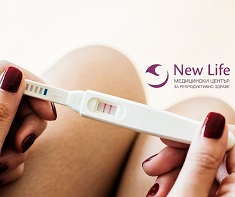Regardless of the desired result, home pregnancy tests are quick, easy to use and most importantly — they are available in every pharmacy.
HOW DO PREGNANCY TESTS WORK?
Home pregnancy tests detect a hormone called beta-human chorionic gonadotropin (hCG) in urine. It is produced by structures of the embryo during the first weeks of pregnancy, and then by the placenta. After that, the hormone enters the bloodstream and is then excreted in the urine.
HCG levels double every day. Many manufacturers claim that their tests are 99% effective on the first day of a missed period. However, early testing may give a false negative result. Therefore, we advise you to wait or repeat the test one week after a missed period.
For the most accurate result, test in the morning right after waking up, because that’s when urine is the most concentrated and hCG levels are highest. If you need to test at another time, withhold bathroom trips for about 4 hours and restrict fluid intake during that time.
CAN MEDICATIONS AFFECT PREGNANCY TEST RESULTS?
Fertility drugs containing hCG may affect the accuracy of the test. All other medications, including antibiotics and oral contraceptives, do not affect pregnancy test results.
I HAVE A POSITIVE TEST BUT I AM NOT PREGNANT
A false positive result is possible soon after a miscarriage, abortion or childbirth. This is because it takes several weeks for the body to completely clear itself of all the hCG it produced.
A false positive result can occur if you recently had a biochemical pregnancy (a type of early miscarriage).
Gestational trophoblastic disease (a rare condition of abnormal growth of trophoblast cells) as well as some hormone-secreting tumors can also produce high levels of hCG, leading to a false positive pregnancy test.
Regardless of whether you’re pregnant or not, it is important to contact a gynecologist if you have a positive pregnancy test. They will most probably order some additional tests (ultrasound, more blood work) depending on your case and guide you to the next steps.













